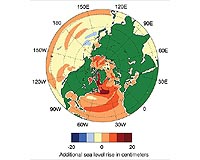| . |  |
. |
Ottawa, Canada (SPX) Jun 05, 2009 Settling the growing debate over ownership of Arctic Ocean resources is complicated by the fact that the various countries involved have different understandings of the geography of the place. Phil Steinberg, an associate professor in the Department of Geography at Florida State University in Tallahassee, says coming to terms with those divergent views is the first necessary step to resolving what is becoming a prickly international issue as global warming opens up more of the Arctic Ocean. In a presentation at the Congress of the Humanities and Social Sciences taking place at Ottawa's Carleton University, Dr. Steinberg says that people make unstated assumptions about geography when they talk about places. In the case of the Arctic Ocean, there are two opposing concepts: Is the Arctic Ocean just water that you pass over, or is it land with water on top of it - land that belongs to a country? He says that when countries such as Russia talk of resource extraction, they are thinking of the Arctic as land with water on top of it. Canada makes the same assumption when it talks of the Northwest Passage as belonging to Canada. The U.S., however, views the Northwest Passage as just water - water that people pass over to travel from one place to another. "In the U.S. national imaginary, I don't think there's the idea that the space up there is divided into territories that belong to anybody," says Dr. Steinberg. He adds that some of those assumptions are built right into our maps. Look at a map of the world, says Dr. Steinberg: Land areas are divided into countries, each in a different colour. That reinforces the idea of ownership. But on a map the sea is a coloured a uniform blue - a graphic representation of the oceans being freely accessible to all. The same idea applies to Antarctica, which is generally coloured white on maps and not marked by firm territorial divisions. In the Arctic, there is one further complicating factor: When the ocean is covered by ice, it can be walked on and to some extent used like land; but when the ice melts, the Arctic is water. "In trying to understand the debate, it's always helpful to understand the implicit references each side is making," says Dr. Steinberg. "Often, the disagreements are over unspoken assumptions. "In the case of the Northwest Passage, a whole lot of what is going on from the U.S. side is fear of setting a precedent. Small issues become big issues when states become fearful of setting precedents." Organized by the Canadian Federation for the Humanities and Social Sciences, Congress 2009 brings together over 8,000 researchers from Canada and around the world.
Share This Article With Planet Earth
Related Links Canadian Federation for the Humanities and Social Sciences Beyond the Ice Age
 Melting Greenland Ice Sheets May Threaten Northeast USA And Canada
Melting Greenland Ice Sheets May Threaten Northeast USA And CanadaBoulder CO (SPX) May 28, 2009 A melting of the Greenland Ice Sheet this century may drive more water than previously thought toward the already threatened coastlines of New York, Boston, Halifax, and other cities in the northeastern United States and Canada, new research shows. The study finds that if Greenland ice melts at moderate to high rates, ocean circulation by 2100 may shift and cause sea levels off the north ... read more |
|
| The content herein, unless otherwise known to be public domain, are Copyright 1995-2009 - SpaceDaily. AFP and UPI Wire Stories are copyright Agence France-Presse and United Press International. ESA Portal Reports are copyright European Space Agency. All NASA sourced material is public domain. Additional copyrights may apply in whole or part to other bona fide parties. Advertising does not imply endorsement,agreement or approval of any opinions, statements or information provided by SpaceDaily on any Web page published or hosted by SpaceDaily. Privacy Statement |